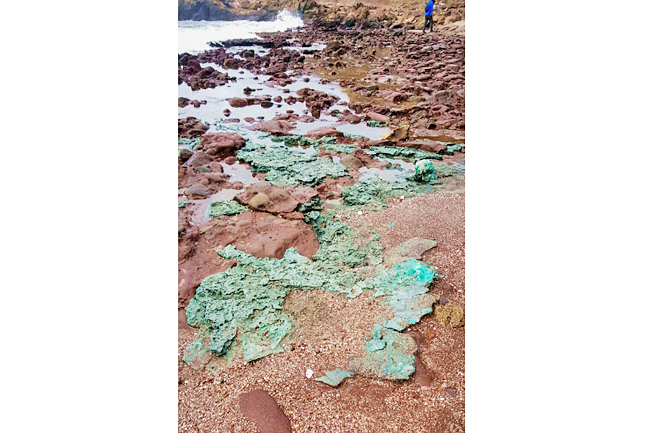RIO DE JANEIRO (AFP) – There are few places on Earth as isolated as Trindade island, a volcanic outcrop off the coast of Brazil.
So geologist Fernanda Avelar Santos found an unsettling sign of human impact on the otherwise untouched landscape: rocks formed from the glut of plastic pollution.
Santos first found the plastic rocks in 2019, when she travelled to the island to research her doctoral thesis on a completely different topic – landslides, erosion and other “geological risks”.
She was working near a protected nature reserve known as Turtle Beach, the world’s largest breeding ground for the endangered green turtle, when she came across a large outcrop of the peculiar-looking blue-green rocks.
Intrigued, she took some back to her lab after her two-month expedition.
Analysing them, she and her team identified the specimens as a new kind of geological formation, merging the materials and processes the Earth has used to form rocks for billions of years with a new ingredient: plastic trash.

“We concluded that human beings are now acting as a geological agent, influencing processes that were previously completely natural, like rock formation,” she told AFP.
“It fits in with the idea of the Anthropocene, which scientists are talking about a lot these days: the geological era of human beings influencing the planet’s natural processes. This type of rock-like plastic will be preserved in the geological record and mark the Anthropocene.”
The finding left her “disturbed” and “upset”, said Santos, a professor at the Federal University of Parana, in southern Brazil. She describes Trindade as “like paradise”: a beautiful tropical island whose remoteness has made it a refuge for all sorts of species – sea birds, fish found only there, nearly extinct crabs, the green turtle.
The only human presence on the South Atlantic island is a small Brazilian military base and a scientific research centre. “It’s marvelous,” she said.
“So it was all the more horrifying to find something like this – and on one of the most ecologically important beaches.”


